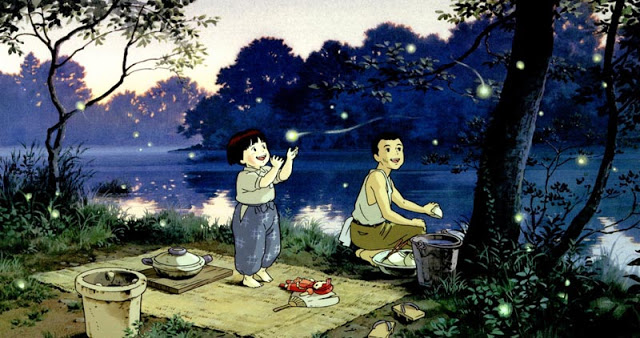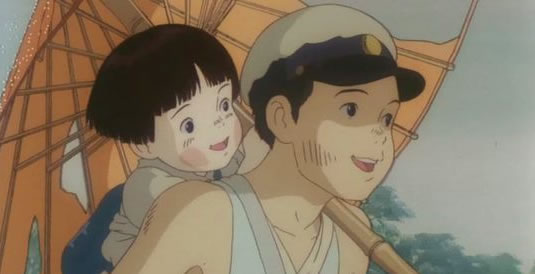Grave of the Fireflies
Una película triste pero de una gran belleza artística y con mucha ternura en sus personajes

Film summary [Theme song of the ending "hotaru"].

I just finished watching "Hotaru no naka" [Japan, 1988] and it has left me in such a state of worry and uneasiness, that I am forced to delay going to bed so that I can write a few words here about this sad story...
The first thing I want to talk about is how amazed I am (since this is the first time it happens to me) that a cartoon movie like this one can "touch" me so deeply. Normally, even if unconsciously, we tend to quickly associate cartoons with stories that are far from reality and, therefore, it is difficult for them to be anything more than simple entertainment. However, in some anime movies, the stories are so well written and crafted that we may be caught off guard and end up whimpering or with severe intellectual trauma™ without even realizing it.
I am not going to tell anything about the plot of the movie, but I am going to talk about the author, Akiyuki Nosaka, was born in 1930 in the city of Nakamura, located in Kanagawa prefecture; her birth caused a serious illness to her mother, who, as a result, could not take care of the little ones and the family moved to live with her aunt; however, her mother recovered and the family had another baby girl, Keiko. In 1945, during heavy U.S. bombing raids, her father died and her mother became seriously ill. Shortly afterward, her sister also died due to malnutrition... Those of you who know what the story is about will appreciate that Hotaru no Haka (Grave of the Fireflies) narrates very clear similarities to her real life. Nosaka is primarily a post-war writer, who narrates the contradictions of Japanese society in that period, but at the same time emphasizes the causes that led to Japan's participation in that historical event. In Hotaru no Haka we can appreciate criticism of the traditional Japanese society, in the sense of the way it got involved in the war, and also in the traditional way of seeing the typical life of that country embodied in his aunt, who does not understand the motivations of Seita, the protagonist, and lets them leave knowing that this will eventually lead to their death by starvation.
Hotaru no Haka is above all a pacifist plea, but at the same time pessimistic... the author spares no detail in describing the plight of Seita and his sister Setsuko, the misery in which they are forced to live, the lack of concern of the rest of society for their problems. In short, a series of events and attitudes that inevitably lead to a tragic outcome?
We find ourselves before a portrait of post-war Japanese society, narrated in a bittersweet, sad style, very much in keeping with the story we are being told, sadly real and, above all, very credible. In this sense, those of you who have seen the movie, if you read the book, will appreciate that it faithfully follows Nosaka's story point by point, but we must say that Nosaka is an author, like almost all those of his generation, extremely realistic, so we will not find in this book the doses of lyricism that can be appreciated in the homonymous movie, but arid descriptions of reality, although always seen from the point of view of the protagonist, Seita -alter ego of the writer, no doubt-.
In short, a sad story, but at the same time recommendable. The greatest sin of mankind is to forget history, and this sad story allows us to not forget how sad war can be, and the dire consequences that any event of this kind brings with it.